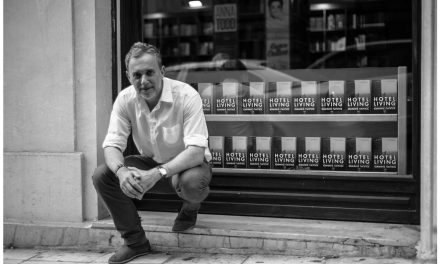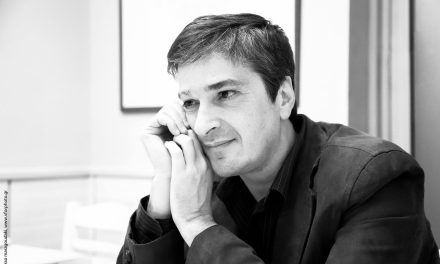It was ten years ago that the venture of FRMK magazine began. It was both a risk, a wish made true against the adverse conditions of the financial crisis, but also a well-considered decision, a natural course following the pre-existing dialogue and the already tested cooperation of the people who created it. In the words of Katerina Iliopoulou, chief editor of the magazine, “Over the years, we quickly established a special interest in the commons, i.e. the vital issues of our time. We thus issued a series of special issues (Poetry and Disease, Diaspora, Art and Politics, The Human Animal, Documentary poetry, Anthropocene) where the fields of poetry, art in general, and social science converge. The core of artistic ventures relates to the detection of how artistic works could constitute a field of radical thought but also of moral stance towards the highly complicated issues of our time”.
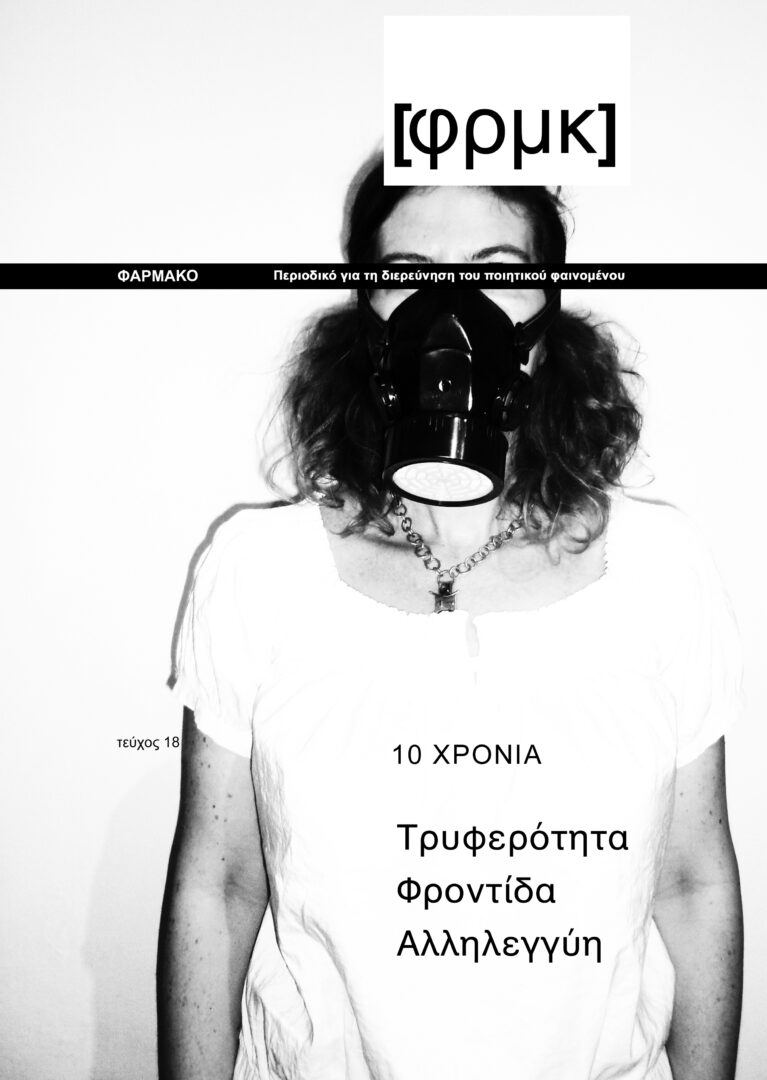
For its 10-year anniversary issue (edited by Katerina Iliopoulou, Panayotis Ioannidis, Iana Boukova), FRMK has chosen the triptych “Tenderness – Care – Solidarity”, concepts that are a constitutional condition for every human relationship but also a vital prerequisite for establishing society itself. At the same time, this triptych reflects the relations between the people at the core of the magazine, but also the project itself, as a gift to its readers. As we all know, in the modern, mainly urban, societies in which we live, these terms are endangered and lacking – but caring for their existence nourishes our own existence.
As essayist and translator Yiannis D. Ioannidis writes in his essay “We is not the plural of I”: “Do to others what you would have them do to you”. These simple words, and the actions that take place in their spirit, bring the concept of care from the periphery to the center of values, i.e. the main criterion based on which one evaluates the quality of oneself, others, as well as the society in which we all live. In other words, if care, tenderness and solidarity express a dimension of our existence, i.e. the existence of all of us, then their absence deeply traumatizes us. Both us and our world. All of us. Because it is in this dimension that We, our common milk, takes root.”
There follows an overview of the magazine’s content, which is a free composition of literary and essay texts by contemporary poets and thinkers from various fields, such as sociology, history, philosophy, moral philosophy, psychoanalysis, political theory, art history.
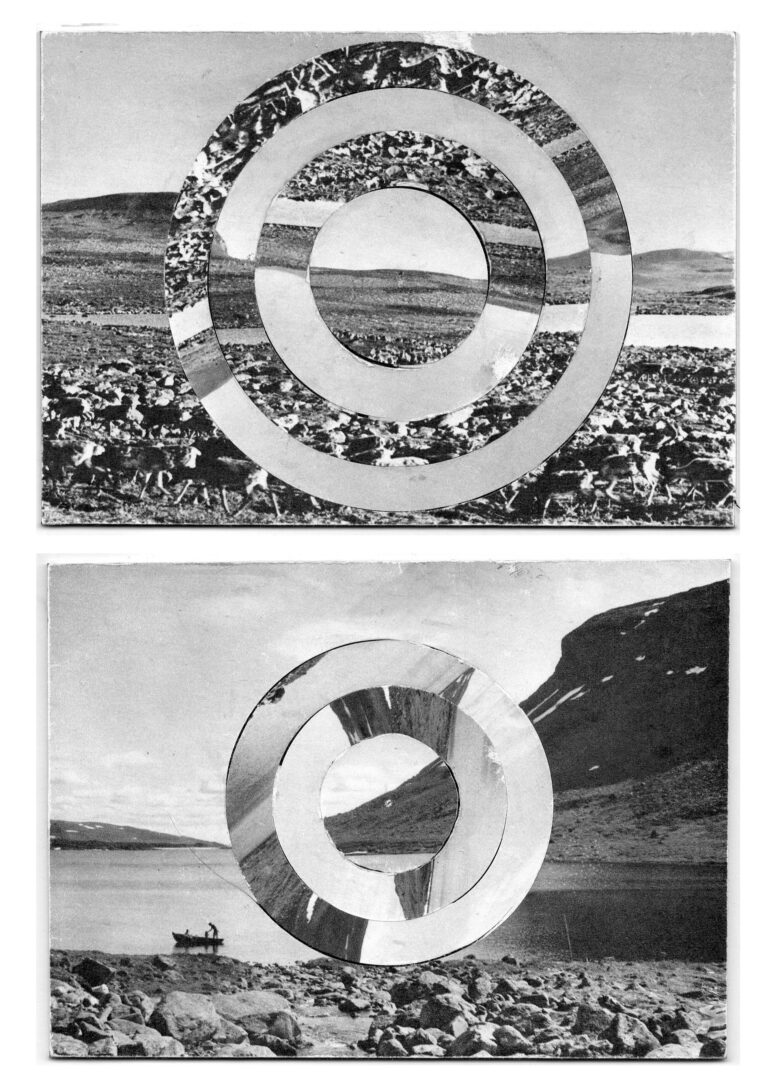
Simon Barker, A Proposal 1,2, 2018, 14.9 x 10.6 cm, collage
Antigoni Samela, sociologist and historian, in her essay “Care as an expression of acceptance of our mortality and as a way of life” elaborates manifestations of care in a kaleidoscopic text with stimulating references: from Sappho’s poetry and the perception of old age in ancient Greece, to the communities of care and solidarity organized within the Warsaw ghetto, the contemporary politics of care through feminist practices and the contradictions of a society of cruelty.
“From the testimony of Tim, a nurse in a British psychiatric hospital: The art of nursing is a form of improvisation, like jazz. It requires flexibility, sensitivity, co-creation. Art is not something you do to someone. In its best moments it looks like the gift of [divine] grace. I’m not religious but words like ‘grace’ and ‘ministry’ are fundamental. Love motivates nurses. Grace involves putting the needs of others before your own. This has nothing to do with the cross of martyrdom, as the offering confirms your ego. Grace is the fruit of care. Why should we leave all good ideas to religion? (…).”
In the words of Ursula Le Guin, “Love can fail, make mistakes… A society can only alleviate unnecessary misery, suffering due to problematic social organization. The rest remains. All of us will know sorrow and pain. And in the end, we will die. Only compassion in the sense of empathy leads to taking responsibility for the other, thus giving meaning to our freedom.”
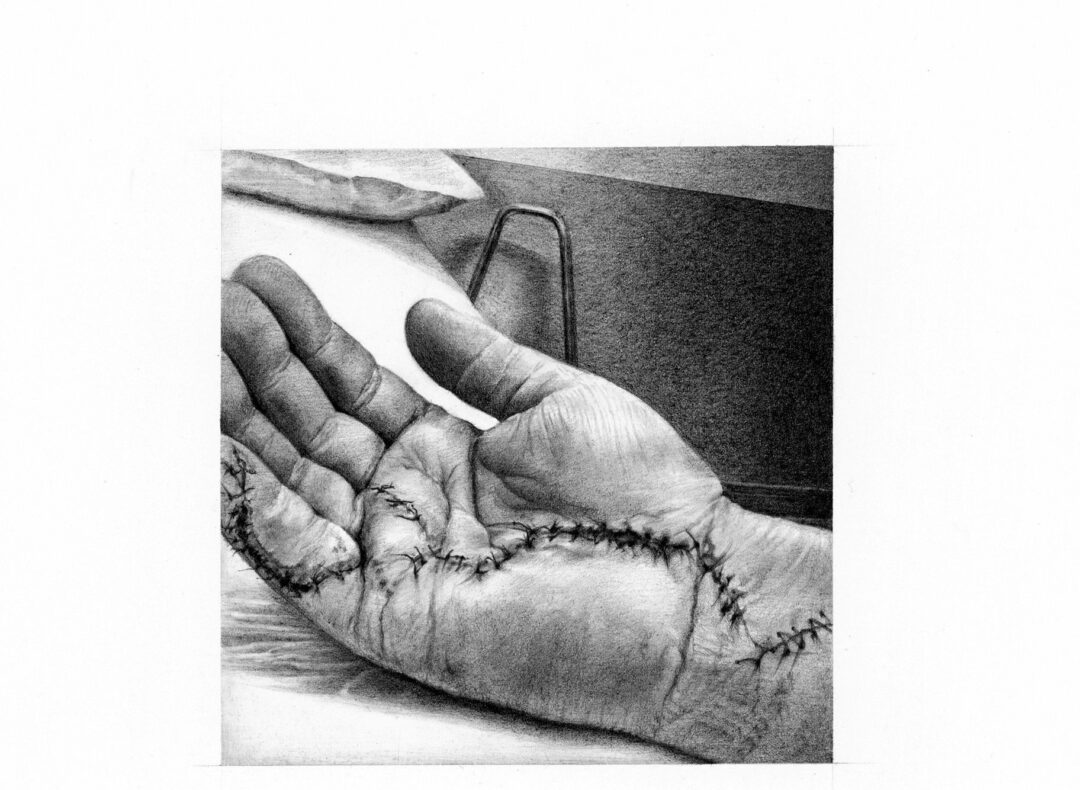
©Fotini Poulia
An excerpt from the work of the American moral, social/political and feminist philosopher Virginia Held is translated by Lefteris Zacharioudakis under the title “The ethics of care as a moral theory”. Held’s work on the ethics of care sparked significant research into the ethical dimensions of caring for others and critiques of women’s traditional roles in society.
On “Solidarity with no metaphysical reasoning/ Dimensions and perspectives of the understanding of solidarity as a moral attitude in Albert Camus’ Plague” writes the PhD candidate Antonis Pericharos, where “Camus’s solidarity is interpreted as a moral attitude towards the community and goes hand in hand with the principle of responsibility, in which man is called upon to take responsibility for himself but at the same time to be (co)responsible for the lives of his fellow human beings.“
On his part, Stergios Mitas (assistant professor of Philosophy of Law at the University of Cyprus and author) writes in his essay titled “Solidarity as a principle of justice. Nine plus one thoughts” about the institutional dimension of solidarity within the legal system, and wonders “But can we talk today, so unsuspectingly, about values, justice, solidarity, etc.?” Without having a lifeless carcass in the mouth or, even worse, a cheating machine in the tongue? (…) But beware, let us not be led to wrong conclusions following a right reservation. The battle for concepts and within concepts is also a battle against forms of social falsehood and suffering.“…
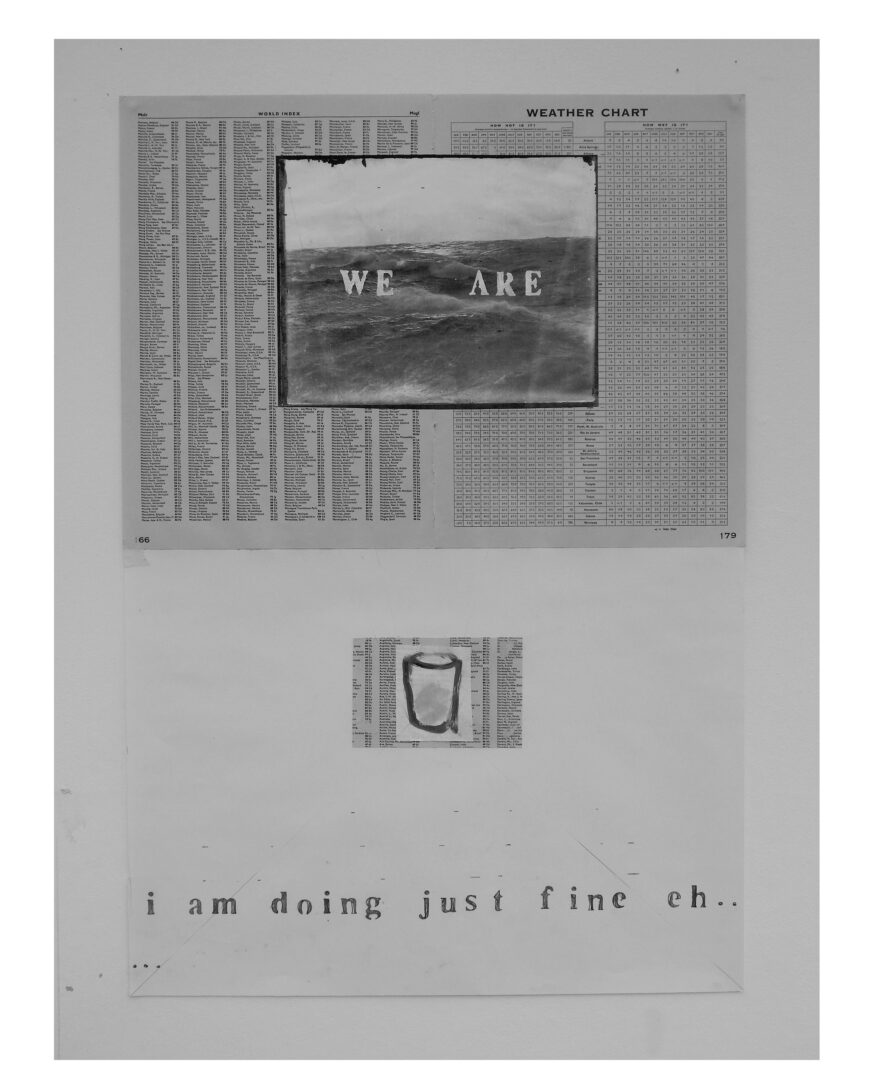
Patrick Jones, Working on the index no25, 78 x 54cm, Photograph, acrylic and graphite on paper
“Today, solidarity is making a comeback. It has been heard very often in recent years – in the midst of a condition of successive, constant crises (economic, health, energy, environmental). The situation, as it is called, ‘permacrisis’ reminds us of the most bare, painful truth: That the most fundamental human bond is our shared, yet so unequal, vulnerability – as well as our codependency. That we all participate in each other’s fate and are (therefore) jointly responsible for it. This is precisely where emphasis laid on a dense, as abovementioned, concept of solidarity takes on strength and meaning. Not just moral or sentimental but an institutional one as well. In summary, it concerns the just distribution, under principles of mutual freedom and proportional equality, of the sufferings and goods of collective existence. In this way, solidarity doesn’t just constitute a guide for overcoming crises, but also a horizon for what kind of institutions we want and owe, in our very collective present and foreseeable future.“
Professor of Political Philosophy and writer Georges Faraklas in his essay “Why it is in our interest to welcome refugees” negotiates the problem of welcoming refugees by examining the concepts of freedom in philosophy from Plato and Aristotle, Kant, to Hannah Arendt and Simone Weil. “Towards the refugee, we must therefore yield to compassion. It is in the interest of our freedom to welcome refugees, because otherwise we become murderers and our freedom is at risk; we may safeguard our standard of living but jeopardize our ability to be free. Only compassionate beings are free.”
The essay titled “Beloved community” (translation Eleni Iliopoulou and Christiana Mygdali) comes from the book A Paradise Built in Hell: The Extraordinary Communities That Arise in Disaster, in which the award-winning American author and activist Rebecca Solnit examines major US disasters from the 1906 San Francisco earthquake to Hurricane Katrina in New Orleans, while also presenting an investigation of the moments of altruism, resourcefulness, and generosity that arise amid disaster’s grief and disruption and considers their implications for everyday life. It points to a new vision of what society could become; one that is less authoritarian and fearful, more collaborative and local.
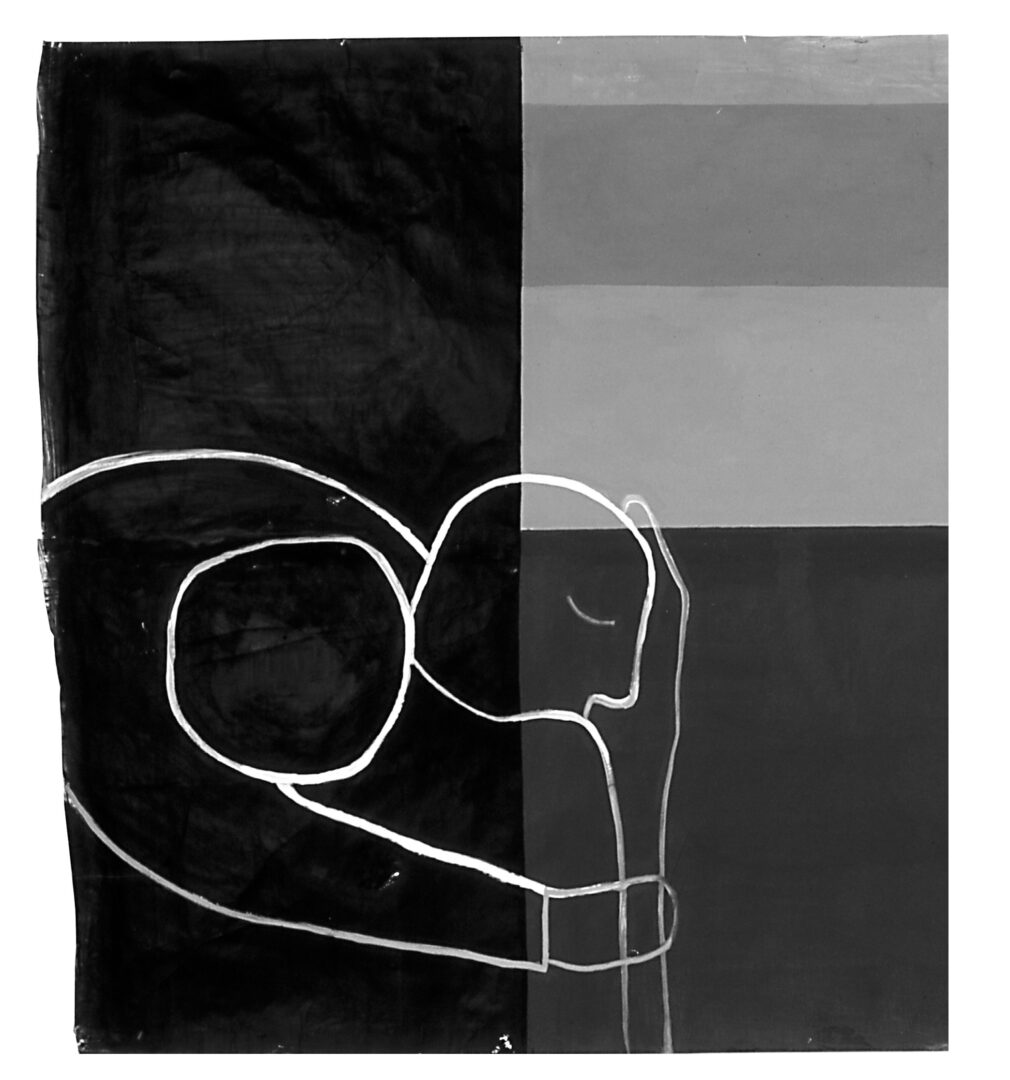
Maria Glyka, untitled (detail), from the series a.g., 2002, 180 x 300 cm, acrylic and oil on paper
In her essay “In Spite of Everything, Spring”, art historian and curator Gelly Gryntaki refers to female friendship through the case of the long-standing friendship of two great artists, Jacqueline Lamba and Frida Kalo. It examines friendship as a field of personal development, solidarity but also happiness through the historical consideration of female friendship and the breaking down of stereotypes.
Linguist and translator Christiana Mygdali in her essay “Why there are no more unicorns” refers to four snapshots of contemporary Greek reality from 2013 to 2023 through actions and practices centered on literature and vulnerable human communities.
Professor at the Department of Architecture (University of Thessaly) and visual artist Zisis Kotionis in his essay “The limits of care” refers to the recent floods in the area of Thessaly and the dissension that followed. As he writes: “On the one hand, the forces of the state and the institutions with the available knowledge and technical apparatus for dealing with the crisis. And, on the other hand, the communities, who have suffered the consequences of the disaster and act with their own forces voluntarily, for the continuation and reproduction of life. During the crisis, the dissension between state aid and the self-reliance of the affected residents is magnified.“
Panayotis Ioannidis translates an excerpt from the important essay of the English writer and psychoanalyst Adam Phillips and the Canadian historian Barbara Taylor, “On kindness”. “So it is not that real kindness requires people to be selfless, it is rather that real kindness changes people in the doing of it, often in unpredictable ways. Real kindness is an exchange with essentially unpredictable consequences. It is a risk precisely because it mingles our needs and desires with the needs and desires of others, in a way that so-called self-interest never can. (The notion of ‘self-interest’ implies that we always know what we want, by knowing what the self is, and what its interests are. It forecloses discovery.) Kindness is a way of knowing people beyond our understanding of them. By involving us with strangers (even with ‘foreigners’ thousands of miles away), as well as with intimates, it is potentially far more promiscuous than sexuality.”
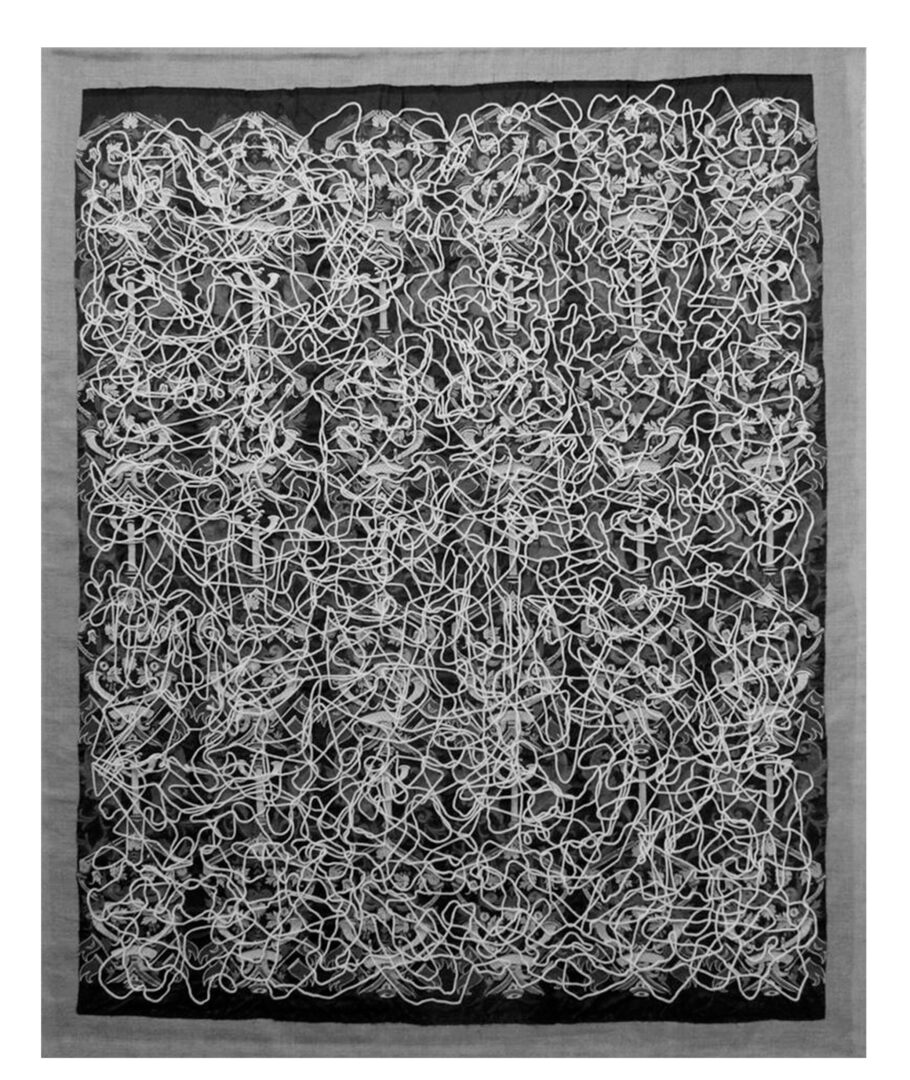
Ria Dama, Aubade, 2015, 130×110, embroidery on silk fabric
Yannis Chondros translates from the book of contemporary French philosopher Anne Dufourmantelle, Puissance de la douceur. “Today what we call ‘depression’ is one of the major ways we deny our need for gentleness. With the best intention, we each create for the other a narrative about our own opacity. We have made exchange into a religion, yet we exchange nothing. What remains the most abrasive is sentimentalization which in reality has come to hate emotion. Because emotion is always also thought. And encourages freedom. Our sensory receptors are brutalized; we collectively come to accept the unjustifiable. There is a brutality in the conditions of material survival; there is a spiritual and emotional desert where beings are trapped. The lack of gentleness is endemic. It has created a form of isolation as potent as a curse. No wealth, no sentimental reassurance can break it.”
The poetic texts in translation belong to Bulgarian poet Marin Bodakov (trans. Iana Boukova), Portuguese poet Tatiana Faia (tr. Tonia Tzirita Zacharatou), the Swiss poet Philippe Jaccottet (tr. Mary Kairidis), the American poet Maggie Nelson (tr. Niki Chalkiadaki) and the German poet Anja Utler (tr. Marina Aga-thaggelidou); while in “Breath of the Century”, we publish a poem by Spanish poet José de Espronceda (tr. Vassiliki Veliou). An anthology of poems on the theme of “The tenderness of living” is composed and translated by Katerina Iliopoulou and Panayotis Ioannidis. Poems and prose by the following greek authors complete the issue: Athina Vogiatzoglou, Dimitra Kotoula, Zissis Kotionis, Dimitra Kationi, Konstantinos Matsoukas, Marios Chatziprokopiou, Panayotis Ioannidis, Katerina Iliopoulou and Phoebe Giannisi. Artistic director Yiannis Isidorou is responsible for the visual section of the magazine with works by Vassilis Vlastaras, Maria Glyka, Ria Dama, Panayotis Koulouras, Ιrini Miga, Rena Papaspyrou, Fotini Poulia, Tassos Trantafyllou, Simon Barker and Peter Jones.
***
SELECTED POEMS
from Α/Z [exc.]
Panayotis Ioannidis
The stag deer
looks at his fawns with pride
under the oleander.
He moves his head;
the antlers
shake the boughs –
pink petals trickle down.
The chestnut tree died
at seventy-five.
How many summers more
will the pomegranate’s shadow last
wedged in the rock?
How many carefree summers,
left for us?
you ask me on the phone
next to the sea.
Through summer and winter,
for ages,
boys had been wearing
shorts:
in the north, in the south.
The boy’s waist as he grows
does not change much:
it’s the legs get longer.
Shorts
remain short,
though shorter every year.
And when they’re baggy,
they last longer:
as the waist grows wider,
and the thighs grow strong.
Plus, during games,
long trousers will get stained,
and torn.
Better
a wounded knee
than patches
– mothers have thought,
over the globe,
for ages.
You save on fabric,
and boys learn
to hurt
and to take care.
And to not be ashamed
to show their wounds.
Like
small
slabs
protruding
from a wall horizontally
in houses built of stone:
they seem placed randomly,
but they are steps
that lead.
(translated by Panayotis Ioannidis)
Ten
Dimitra Kationi
Don’t desire out of desire, don’t hide, it’s like murder, don’t steal what’s yours, don’t look beyond the mirror, don’t invalidate the blood, don’t say your name again, don’t cry, my love, don’t cry, don’t cry, the undermentioned ten commands towards heaven are not even ten, God is praying to us, just listen.
(from the poetry book “Animals, Plants”, Kedros editions 2024, translated by Katerina Iliopoulou)
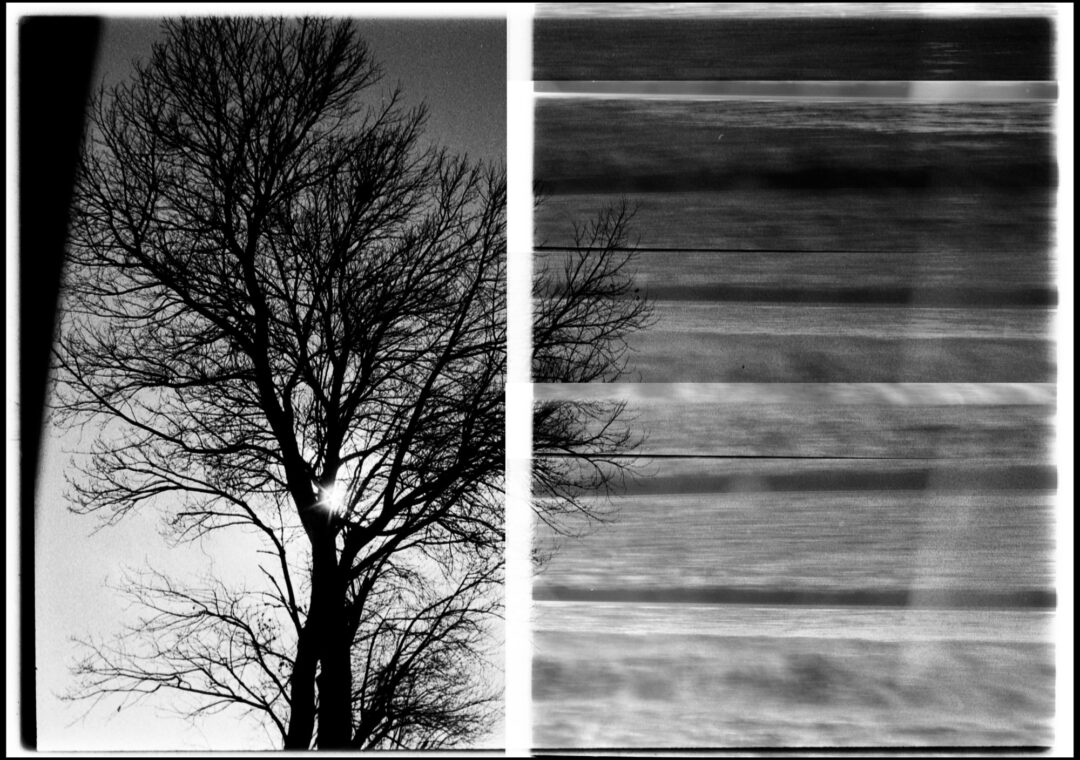
[p. 166-167] Yiannis Isidorou, Everything in it’s right place_2, inject printing 30×40, photorag 308gsm. 2019
Pendulum I (experiment)
Katerina Iliopoulou
Walk like you weren’t
just one
body
Surrounded by isolation
Suffocating
Allergic
As if you hadn’t swallowed a stone
As if you had not become unrecognizable
Reality is physical size
(that which disappears)
Pendulum II (experiment)
Try to move
as if there was no lack
but fresh snow
step where now untouched
and only pain
Say, I lay down
I mean, I recognize a place in you
You are a position
This position contains a stock capable of igniting
Try to move
Pendulum III (experiment)
as if you heard the cry
It is the invocation of translation
Everyone wants to be read
in their language
A hunger for recognition
The other is facing you and this is not a metaphor
(translated by Katerina Iliopoulou)
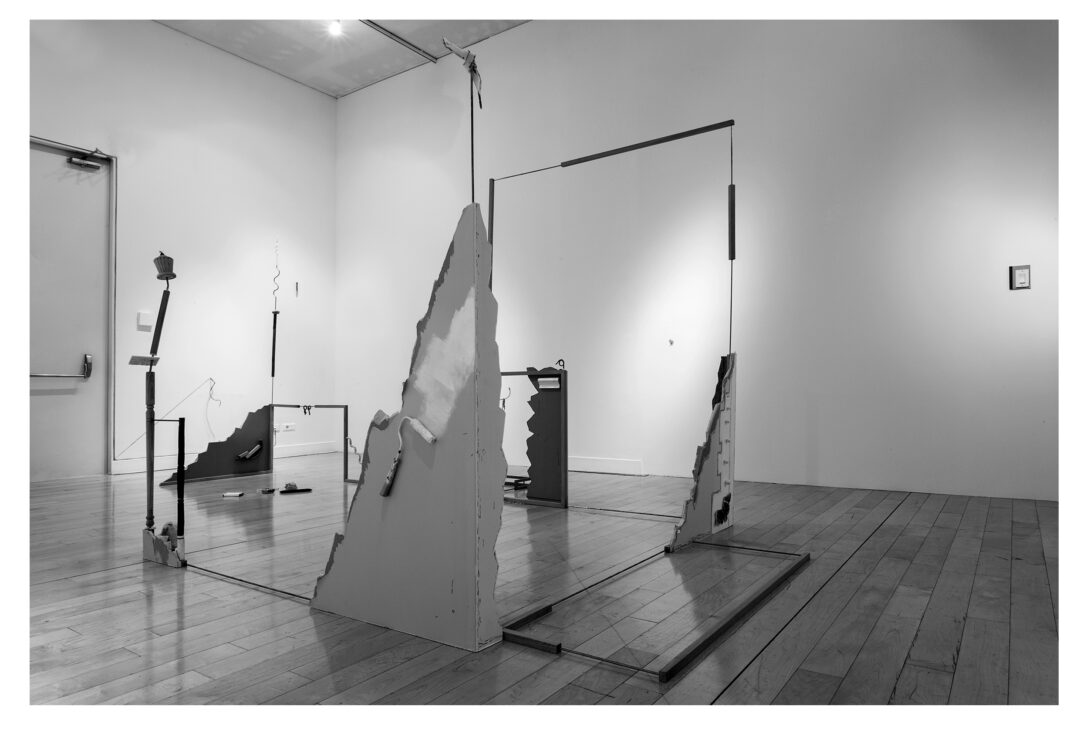
Irini Miga, place from a different timeline, installation aspect 2016
Phoebe Giannisi
A. On Mud (an excerpt)
1 I love the rain
1 The rain is merciful
2 The rain is for the body
3 The rain washes away
4 The rain comes from above
5 Rain is a goddess
6 Rain is a goddess, feminine.
Omvros, male.
7 I look at the dictionary
online
8 Rain: downpour, bora, storm
Male : female
9 I love these words:
rain rain downpour
and there may be a storm
10 Omvros, male god, Zeus.
11 It starts to rain.
It will rain a lot, they said on TV.
12 Zeus male, holding thunderbolt
the almighty.
Rain will falla hard on our heads, they said on TV.
13 And the heavens opened
14 You know that first the rain washes off
and then it stinks?
Humans
are made of mud-
they were never baked
to become clay
16 Zeus shakes the aegis
17 There we are now inside the storm
18 Do you know what aegis is?
Shepherd’s cape made of goatskin
the one that Zeus sucked from
19 Now: rivers
20 Now: rivers of mud
21 Now: storm at sea
22 Now: Darkness
darknes for a long time
and lightning
23 Now: the river swells
24 Now: the river overflowed
25 Now: The river broke
they shout
Only voices are heard
Only voices
26 The rain is merciful:
I often surrendered to her
27 A truck stops at the house next door
And it brings out a 97-year-old grandmother
along with her daughter – a grandmother too
28 They are hosted by the neighbors
they will offer them shelter
dry bed and food
29 On the day of the second rainfall
before the river broke
it was the time they buried grandma.
A refugee.
Her mother spoke only Turkish.
30 However, with a storm she went again for the long journey,
Lena said
31 Oh rain! How merciful you are
(translated by Katerina Iliopoulou)
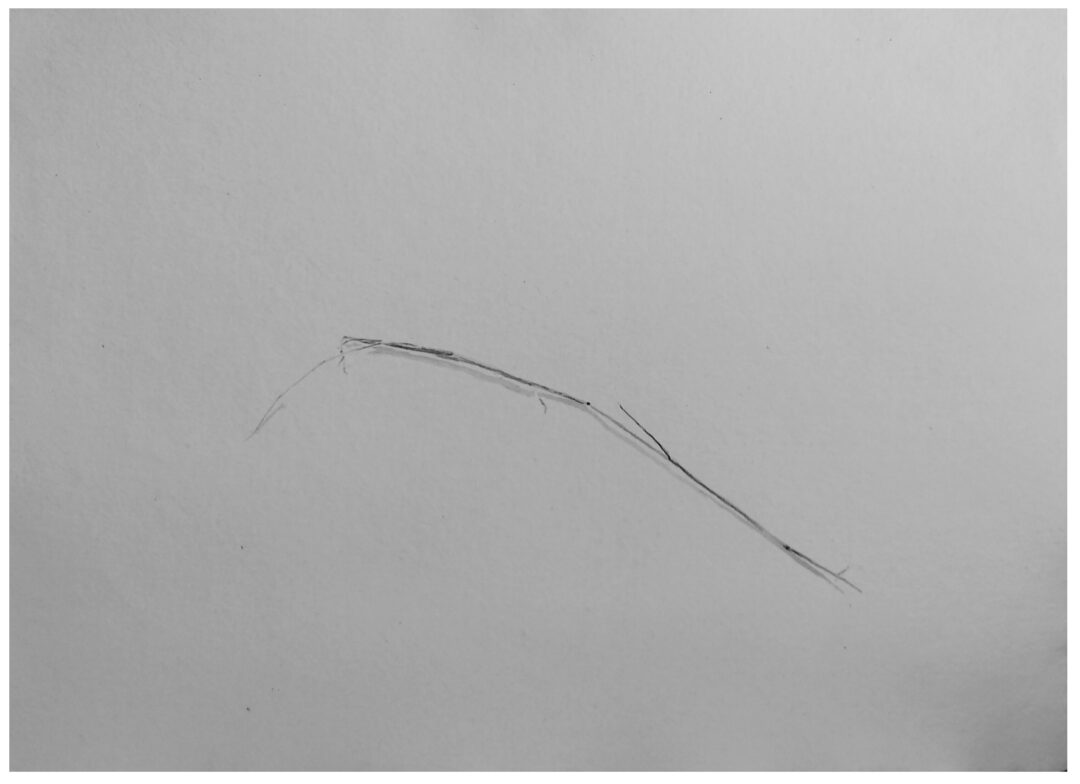
Panagiotis Koulouras, Notes on the daughter, 2019, 20×30, water paintings
Konstantine Matsoukas
DEAR FRIEND,
You from the West Coast and me from Volos but, for years now, I’ve been meaning to tell you, so what?
Being so very different does not preclude being very much alike.
Things in my country are the same as ever – people here love sweets and savories equally, they celebrate their birthday every day, they keep time open as if it were a door. We are small but greatly available, we have room to spare.
We Greeks were taught this much early on: behind every story there is another story; the human face is timeless, imprinted in the sky.
Characters in sagas/novels/legends always come back like a mirror’s reflections, like memory.
A detail suffices – a ring, a scar – for us to glimpse you standing naked behind this century’s disguise.
A body made of semolina and seaweed, sweet and savory, with shoes on so that it can always return.
(from the book “Paregoretic”, FRMK editions 2023, translated by Konstantine Matsoukas)
***
Chief editor of the magazine is the writer Katerina Iliopoulou, Yiannis Isidorou is the artistic director, and the editing group consists of the poets, Vassilis Amanatidis, Orfeas Apergis, Iana Boukova, Phoebe Giannisi, Panayotis Ioannidis, Theodore Chiotis and the translator Eleni Iliopoulou.
A.R.
Read also: Reading Greece: A tribute to [FRMK], a Literary Magazine on the Poetic Phenomenon and its Relation to Arts and Society; Reading Greece: Katerina Iliopoulou on Poetry, Language and Art as a Denial of Defeat; Reading Greece: Orfeas Apergis on Poetry as Ferment, Experimentation and a Promise of Revolution; Reading Greece: Phoebe Giannisi on the Meeting Point between Poetry, Performance, Representation and the Natural World; Reading Greece: Panayotis Ioannidis on Poetry as an Art of Sounds and the Quest to Immortalise the Moment through Words; Reading Greece: Iana Boukova – “We Should Learn to Use the Way of Poetry to Walk in the World”; Reading Greece: Theodoros Chiotis on ‘Futures: Poetry of the Greek Crisis
TAGS: LITERATURE & BOOKS | READING GREECE


